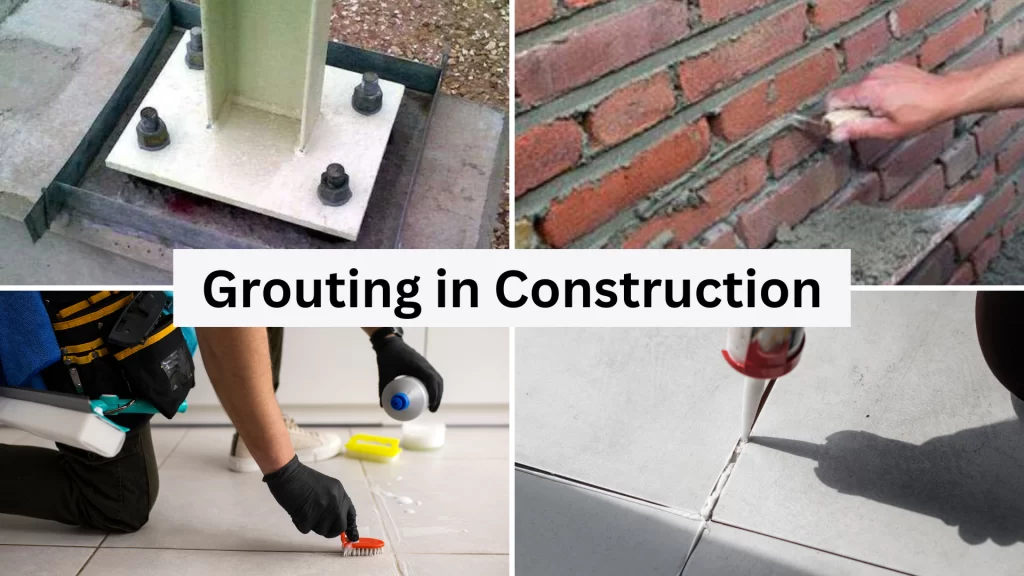Anchoring bolts, repairing cracks, or reinforcing foundations, grouting has become an essential technique in modern construction practices. While it may often be overlooked, it plays a crucial role in ensuring the structural integrity and stability of various projects.
Grouting is a critical construction process that helps increase the structural integrity, stability, and durability of various construction elements. It involves filling gaps, voids, or spaces between surfaces with a fluid material, creating a tight, durable bond that enhances the overall strength and performance of the structure. In this blog, we will understand what grouting is in construction and explore its importance, its applications, and the different types of grout materials commonly used in construction projects.
The critical aspect is that the grout fills the gaps that the construction material cannot fill on its own, essentially acting as a “glue” binding everything together. By preventing movement, the application of grout significantly reduces the risk of settling, shifting, or deterioration of the construction over time. This not only extends the lifespan of the structure but also contributes to the safety of occupants and the surrounding environment. It helps achieve better quality in construction and enhances the longevity of construction components.
Types of Grouting Materials Used in Construction
There are several types of grouting materials used in construction. The choice of material depends on the requirements of the specific construction task.
Here, we explore some of the significant types:
Cement Grouting
Cement is a commonly used grouting material typically used for soil stabilization and structure leveling. It involves injecting a mixture of cement, water, and sometimes sand into gaps, which hardens over time to form a strong and stable bond. This type of grout is ideal for filling voids in concrete structures (also known as concrete grouting), repairing cracks, and improving the load-bearing capacity of foundations.
Chemical Grouting
Chemical compounds, such as polyurethane or acrylate, are injected into voids. These chemicals expand upon contact, filling gaps and sealing against water infiltration. This type of grout is particularly useful for waterproofing, soil stabilization, and repairing underground structures.
Structural Grouting
Structural grouting focuses on creating a solid connection between structural components, such as columns and beams. Epoxy grout, a type of structural grout, offers exceptional strength and durability. It’s commonly used to anchor bolts, reinforce concrete elements in high-stress areas, and fill cracks or gaps in existing structures.
Bentonite Grouting
Bentonite grouting employs a mixture of bentonite clay and water to form a gel-like substance. It is a popular choice for sealing wells and boreholes due to its swelling properties, as it expands when interacting with water, effectively sealing off cavities. This type of grout is often used for sealing and stabilizing soil, preventing water penetration, and reducing potential ground movement.
Bituminous Grouting
This involves using a bituminous compound, which helps seal and waterproof roofs, foundations, and basement structures. It provides excellent durability and resistance against UV radiation and harsh weather conditions. This type of grout is used in scenarios where water penetration needs to be minimized, such as in tunnels and underground structures.
Resin Grouting
Resin grouting utilizes epoxy, polyurethane, or other liquid resins that harden to form a strong bond when cured. These resins offer high tensile and compressive strength, making them suitable for various applications. Resin grout is often used to repair cracks in concrete due to its excellent adhesive properties and strength.
Advantages of Grouting in Construction
Understanding what grouting is in construction also involves recognizing its several benefits. Here are some of its major advantages:
Enhanced Structural Stability
Grout fills the voids in construction materials, thereby increasing overall structural stability.
Leak Prevention
Grout can serve as a barrier that prevents water and other fluid leakages.
Increased Load-Bearing Capacity
Grouts like cement grouting materials enhance the load-bearing capacity of structures by providing more strength and support.
Corrosion Resistance
Some materials, such as epoxy grout, provide corrosion resistance, increasing the lifespan of the construction.
Soil Stabilization
Grouts play an essential role in soil stabilization, especially in the construction of foundations or underground structures.
Sealing Off Cavities
Grout can effectively seal off cavities and gaps, preventing water infiltration or soil intrusion.
Structural Repair
Resin and epoxy grouts are often used to repair cracks and damages in concrete.
Grouting is an indispensable part of modern construction, offering solutions to enhance structural integrity, prevent leaks, and ensure long-term durability. By choosing the appropriate grouting material for your project, you can achieve superior results and a more robust construction.
Conclusion
In conclusion, understanding grouting in construction reveals its critical role in enhancing the stability, strength, and durability of structures. As construction professionals constantly seek cost-effective and durable solutions, implementing the appropriate grouting techniques can lead to more successful and long-lasting projects.
By choosing SRMPR Cements, you ensure superior quality and durability for your construction needs. Our products are designed to optimize the effectiveness of grouting techniques, providing exceptional strength and stability to your projects. Trust SRMPR Cements for reliable, high-performance results that stand the test of time.



